-
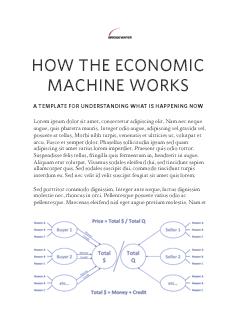
Economic Principles
-
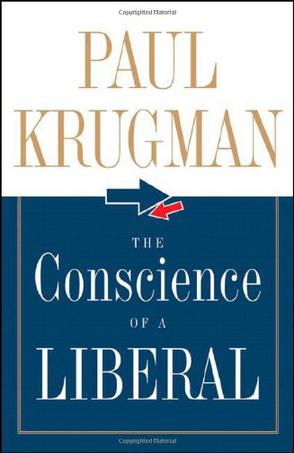
The Conscience of a Liberal
What has gone wrong with America? With The Conscience of a Liberal, best-selling author Paul Krugman points the way to a new New Deal. America emerged from Franklin Roosevelt's New Deal with strong democratic values and broadly shared prosperity. But for the past thirty years American politics has been dominated by a conservative movement determined to undermine the New Deal's achievements - a movement whose founding manifesto was Barry Goldwater's The Conscience of a Conservative. That movement has been highly successful in turning the clock back: both the inequality of today's America and the corruption of its political life hark back to the age of the robber barons. Now the tide may be turning - and in The Conscience of a Liberal Paul Krugman, the world's most widely read economist and one of its most influential political commentators, charts the way to reform. Krugman ranges over a century of history, from the political economy of the Gilded Age - which seems all too familiar these days - to the calamities of the Bush years, which he argues were inevitable once movement conservatives gained full control of the U.S. government. He shows that neither the middle-class America the baby boomers grew up in nor the increasingly oligarchic nation we have become over the past generation evolved naturally: both were created, to a large extent, by government policies guided by organized political movements. He explains how defenders of inequality have exploited cultural and racial divisions to their advantage, while reformers have found ways to bridge those divisions. And he argues that the time is ripe for another great era of reform. Last but not least, The Conscience of a Liberal outlines a program for change. It shows how universal health care can be the centerpiece of a new New Deal, just as Social Security was the core of the original. It explains what can be done to narrow the wealth and income gap. And it shows how a new political coalition can both support and be supported by reform, making our society not just more equal but more democratic. -
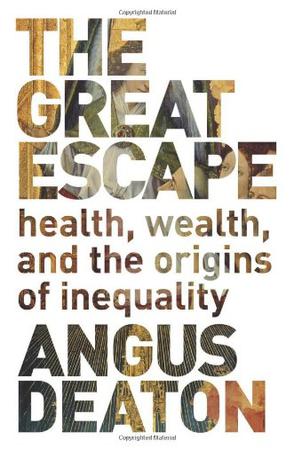
The Great Escape
The world is a better place than it used to be. People are wealthier and healthier, and live longer lives. Yet the escapes from destitution by so many have left gaping inequalities between people and between nations. In The Great Escape, Angus Deaton--one of the foremost experts on economic development and on poverty--tells the remarkable story of how, starting 250 years ago, some parts of the world began to experience sustained progress, opening up gaps and setting the stage for today's hugely unequal world. Deaton takes an in-depth look at the historical and ongoing patterns behind the health and wealth of nations, and he addresses what needs to be done to help those left behind. Deaton describes vast innovations and wrenching setbacks: the successes of antibiotics, pest control, vaccinations, and clean water on the one hand, and disastrous famines and the HIV/AIDS epidemic on the other. He examines the United States, a nation that has prospered but is today experiencing slower growth and increasing inequality. He also considers how economic growth in India and China has improved the lives of more than a billion people. Deaton argues that international aid has been ineffective and even harmful. He suggests alternative efforts--including reforming incentives to drug companies and lifting trade restrictions--that will allow the developing world to bring about its own Great Escape. Demonstrating how changes in health and living standards have transformed our lives, The Great Escape is a powerful guide to addressing the well-being of all nations. Endorsement: "There is nobody better than Angus Deaton to explain why our lives are longer, healthier, and more prosperous than those of our great-grandparents. The story he tells is much more than an inexorable march of progress--it has also been unequal, uneven, and incomplete, and at each step, politics has played a defining role. This is a must-read for anybody interested in the wealth and health of nations."--Daron Acemoglu, coauthor of Why Nations Fail "At once engaging and compassionate, this is an uplifting story by a major scholar."--Paul Collier, author of The Bottom Billion "Magisterial and superb."--William Easterly, author of The White Man's Burden "The Great Escape tells the two biggest stories in history: how humanity got healthy and wealthy, and why some people got so much healthier and wealthier than others. Angus Deaton, one of the world's leading development economists, takes us on an extraordinary journey--from an age when almost everyone was poor and sick to one where most people have escaped these evils--and he tells us how the billion still trapped in extreme poverty can join in this great escape. Everyone who wants to understand the twenty-first century should read this book."--Ian Morris, author of Why the West Rules--for Now "Deaton's account of global advances in health is magisterial. It is especially convincing in disentangling economic progress from technological growth as sources of health improvements. A very big story, this book should affect the way we think about human development and the role of science and science-based government programs. The language is modest and graceful, the use of evidence compelling, and the illustrations highly attractive."--Samuel Preston, University of Pennsylvania -
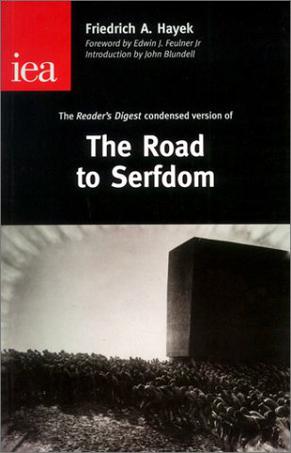
The Road to Serfdom
In the last years of World War II, Friedrich Hayek wrote The Road to Serfdom. He warned the allies that policy proposals which were being canvassed for the post-war world ran the risk of destroying the very freedom for which they were fighting. On the basis of 'as in war, so in peace', economists and others were arguing that the government should plan all economic activity. Such planning, Hayek argued, would be incompatible with liberty, and had been at the very heart of the movements that had established both communism and Nazism. On its publication in 1944, the book caused a sensation. Neither its British nor its American publisher could keep up with demand, owing to wartime paper rationing. Then, in 1945, Reader's Digest published The Road to Serfdom as the condensed book in its April edition. For the first and still the only time, the condensed book was placed at the front of the magazine instead of the back. Hayek found himself a celebrity, addressing a mass market. The condensed edition was republished for the first time by the IEA in 1999 and has been reissued to meet the continuing demand for its enduringly relevant and accessible message. -
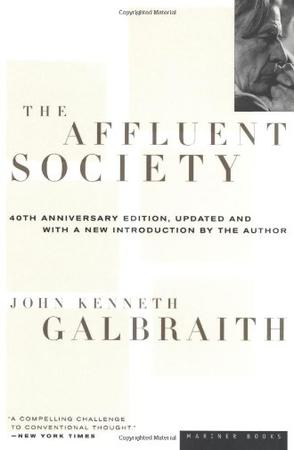
The Affluent Society
Galbraith's classic on the "economics of abundance" is, in the words of the New York Times, "a compelling challenge to conventional thought." With customary clarity, eloquence, and humor, Galbraith cuts to the heart of what economic security means (and doesn't mean) in today's world and lays bare the hazards of individual and societal complacence about economic inequity. While "affluent society" and "conventional wisdom" (first used in this book) have entered the vernacular, the message of the book has not been so widely embraced--reason enough to rediscover The Affluent Society. -
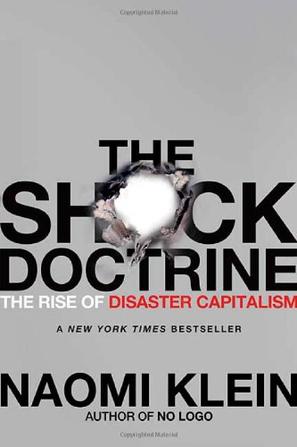
The Shock Doctrine
The bestselling author of No Logo shows how the global free market has exploited crises and shock for three decades, from Chile to Iraq In her groundbreaking reporting over the past few years, Naomi Klein introduced the term disaster capitalism. Whether covering Baghdad after the U.S. occupation, Sri Lanka in the wake of the tsunami, or New Orleans post-Katrina, she witnessed something remarkably similar. People still reeling from catastrophe were being hit again, this time with economic shock treatment, losing their land and homes to rapid-fire corporate makeovers. The Shock Doctrine retells the story of the most dominant ideology of our time, Milton Friedman s free market economic revolution. In contrast to the popular myth of this movement s peaceful global victory, Klein shows how it has exploited moments of shock and extreme violence in order to implement its economic policies in so many parts of the world from Latin America and Eastern Europe to South Africa, Russia, and Iraq. At the core of disaster capitalism is the use of cataclysmic events to advance radical privatization combined with the privatization of the disaster response itself. Klein argues that by capitalizing on crises, created by nature or war, the disaster capitalism complex now exists as a booming new economy, and is the violent culmination of a radical economic project that has been incubating for fifty years. From Publishers Weekly The neo-liberal economic policies—privatization, free trade, slashed social spending—that the Chicago School and the economist Milton Friedman have foisted on the world are catastrophic in two senses, argues this vigorous polemic. Because their results are disastrous—depressions, mass poverty, private corporations looting public wealth, by the author's accounting—their means must be cataclysmic, dependent on political upheavals and natural disasters as coercive pretexts for free-market reforms the public would normally reject. Journalist Klein (No Logo) chronicles decades of such disasters, including the Chicago School makeovers launched by South American coups; the corrupt sale of Russia's state economy to oligarchs following the collapse of the Soviet Union; the privatization of New Orleans's public schools after Katrina; and the seizure of wrecked fishing villages by resort developers after the Asian tsunami. Klein's economic and political analyses are not always meticulous. Likening free-market shock therapies to electroshock torture, she conflates every misdeed of right-wing dictatorships with their economic programs and paints a too simplistic picture of the Iraq conflict as a struggle over American-imposed neo-liberalism. Still, much of her critique hits home, as she demonstrates how free-market ideologues welcome, and provoke, the collapse of other people's economies. The result is a powerful populist indictment of economic orthodoxy.